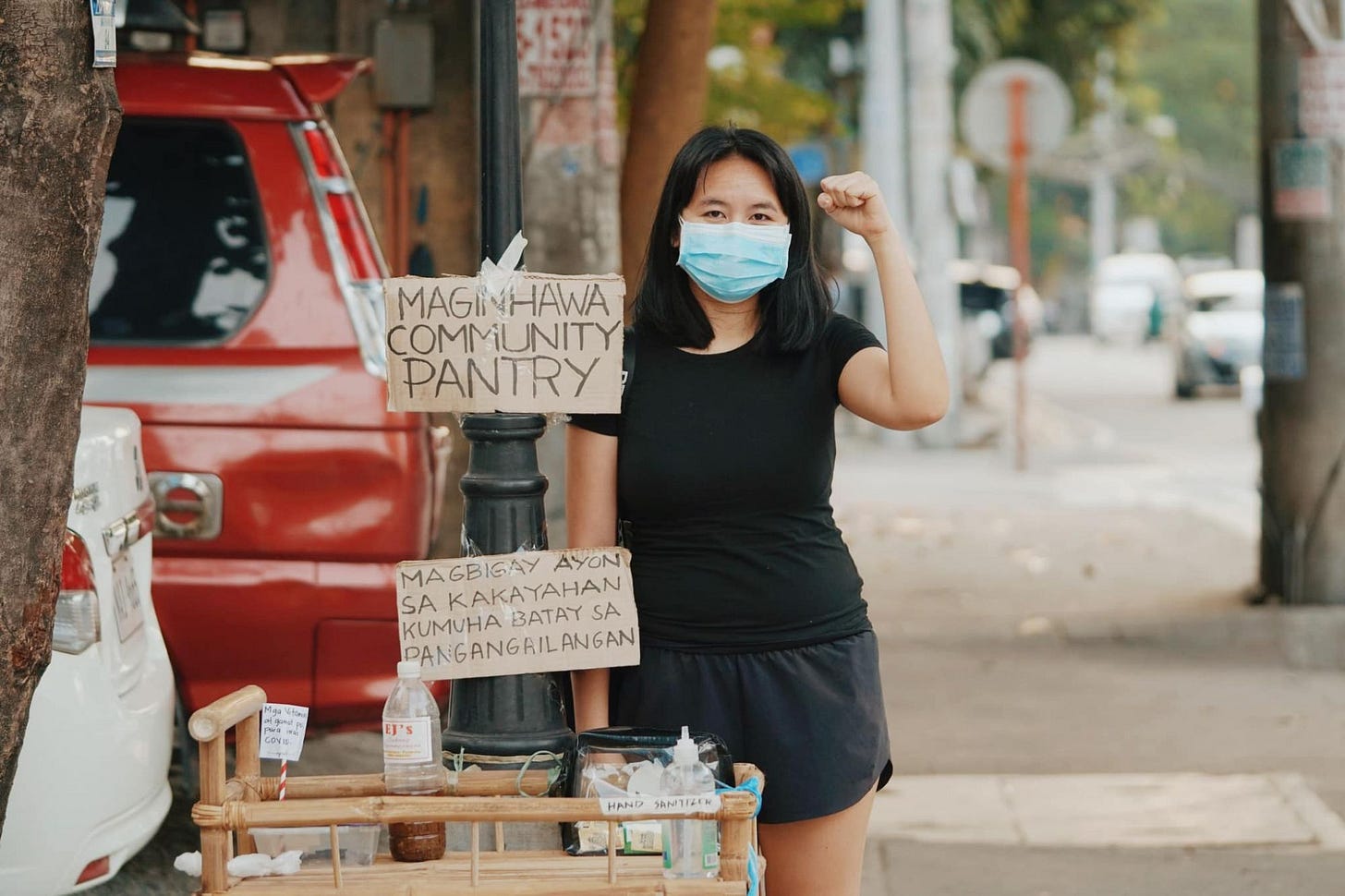#6: Beyond Generosity
Sharing and generosity are crucial during these times, but so is justice.
Sometimes the best solutions are the most simple. And unfortunately it’s these remedies that are often faced with the most backlash by powerful forces. In many cultures there are terms/values that emphasize the importance of sharing with your community and the deep importance of reciprocity. These values date back long before any formal political or economic model. And yet it is horrifying to see the hostility of those in charge against basic human decency.
In the Philippines there is the concept of Bayanihan - a Tagalog word essentially meaning being in community. With that spirit, people began setting up community pantries as a way to support those impacted by the economic hardships around COVID. The movement spread to all over Manila and across the country, with the basic principle of take what you need, give what you can. The concept inspired people in Timor-Leste to organize their own community pantries as they face the economic impacts of a year of lockdown and the recent flooding in the country. K-pop fans (who continually show up in extraordinary ways all over the world) organized together to start themed pantries. Unfortunately, many of those managing community pantries were red-tagged by police and labelled as communists (which the Philippine President Duterte declared as terrorists. People labeled as such had been targets of harassment, extrajudicial killings, and disappearances). One general went so far as saying the act of giving to others was an act of Satan.
Ana Patricia Non, one of the people behind the Maginhawa community pantry | Photo: Anjo Lapresca >>
Sharing and generosity are crucial during these times, but so is justice. Political leaders in a handful of wealthy nations can take things a step forward and waive intellectual property rights on vaccines. Many religious, political, civil leaders are calling for an end to the vaccine apartheid. This “shocking imbalance” is one of the most horrifying inequalities in the world. Low-income nations have received just 0.2% of all vaccines administered. The solution is there. It’s possible. I highly recommend supporting groups pushing for the vaccine waiver - like the People’s Vaccine Alliance.
HIGHLIGHT
At the recent Global Just Recovery Gathering, thousands of people all over the world to envision how to build a world that centers climate justice and climate action. There were lots of amazing panels, workshops and cultural sessions. Check out this panel “How to Postpone the End of the World” with Vandana Shiva, Ailton Krenak, Tasneem Essop & Adriana Calderón.
OUR BASKET
For this month, we wanted to focus the basket on stories that relate to protecting water and land.
The majority of the world’s tuna fishing takes place in the rich waters of the central Pacific. Eight island nations have created a diplomatic win and found a way to protect tuna populations, while also supporting local communities. >>
There is real momentum for the Indigenous food sovereignty movement, with more Native American nations able to regain access to land and waters. For example, the Yurok Tribe is moving forward with an impressive project to restore crucial salmon habitats. >>
Wanjira Maathai, Wangari Maathai’s daughter, is following in her mother’s footsteps and continues to lead movements in Kenya for conservation and protecting green spaces. >>
Communities in Namibia are organizing to stop oil exploration in the Okavango Delta. >>
Indian farmers are reviving Indigenous biodiversity practices and find new ways to decolonize the cotton industry. >>
The practice of rewilding has become increasingly popular in Scotland with a serious push to make it “the world’s first Rewilding Nation.” >>
Great Reads:
Dare we hope? Here’s my cautious case for climate optimism. By Rebecca Solnit >> “Each shift makes more shifts possible. But only if we go actively toward the possibilities rather than passively into the collapse”
How the Human Life Span Doubled in 100 Years. By Steven Johnson >> “Between 1920 and 2020, the average human lifespan doubled. How did we do it? Science mattered — but so did activism.”
Thelma Young-Lutunatabua is the Editor of Radical Reimagining
Global editorial support provided by: Rebecca Solnit, Brianna Fruean, Louise Hazan, Nathalia Clark, Zeph Repollo, Lerato Ngakane, Rukiya Khamis
If you have stories that you would like to share, please reach out to us on Instagram at @Radicalreimagining or email us rreimagining@gmail.com
If you got this message forwarded to you, you can sign up to get the next edition of the newsletter.


